Innovations highlighted at China Poverty Reduction Intl Forum

The 2017 China Poverty Reduction International Forum was held on Friday in Beijing. This event has attracted more than 100 participants from seven countries, including officials, experts as well as representatives from international organizations, academia, business and NGOs. They had a series of in-depth discussions on how to develop poverty alleviation cases and share China's experience, in order to help other developing countries find their way out of poverty.
The theme of the forum was "Developing and Sharing Governance Solutions to Reduce Poverty". Innovative tools were introduced along with examples of successful progress. These highlighted experience in China and elsewhere from different perspectives.
The forum was co-hosted by the China Internet Information Center (CIIC), International Poverty Reduction Center in China (IPRCC), World Bank, Food and Agriculture Organization of the United Nations (FAO), and Asian Development Bank (ADB). It was jointly organized by China.org.cn, China Development Gateway, and Ada Technology (Beijing), while supported by Red Fortune (Beijing) Investment Management.
Last year's forum saw the formal launch of the Global Poverty Reduction & Inclusive Growth Portal (GPIG). Initiated by the World Bank and supported by ADB, the GPIG portal is co-hosted and co-managed by IPRCC and CIIC.
Following a year of development, the portal is now supported by a strong network of contributors, promoting knowledge-sharing online and offline. It brings together information from different sources in a standardized way. By hosting, organizing, managing or delivering online and offline events, the portal promotes international cooperation and capacity building activities, contributing to the successful achievement of the Sustainable Development Goals (SDGs).
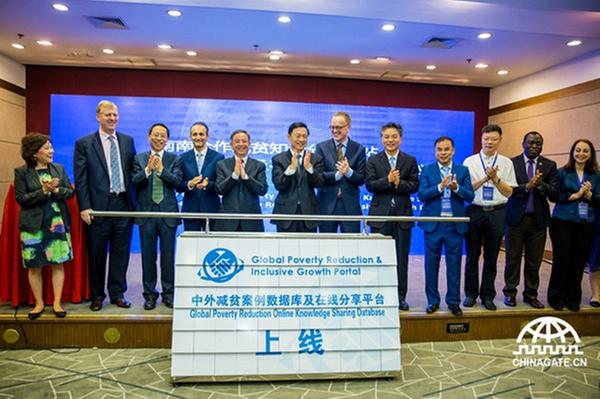 |
GPIG's launch of Global Poverty Reduction Online Knowledge Sharing Database was a highlight of the forum. The database classifies and translates a large number of poverty reduction cases from both China and the international community. Designed for worldwide users, its systematic presentation of poverty alleviation cases is unprecedented. Applying tree diagrams, it provides a clear picture of how China and other international bodies address the problem, focusing in particular on cases which are highly replicable in a technical sense. To facilitate social participation, the platform contains a guide to help users upload cases in standard templates, turning GPIG from an information sharer into a producer.
FAO, together with CIIC, has released a video named Think Innovatively for Poverty Reduction, exploring new measures to promote knowledge-sharing in support of the cause. The video urges to reduce rural poverty through innovative ways such as e-commerce, story-telling sessions, online live broadcasts and celebrity support, in the Internet Plus era.
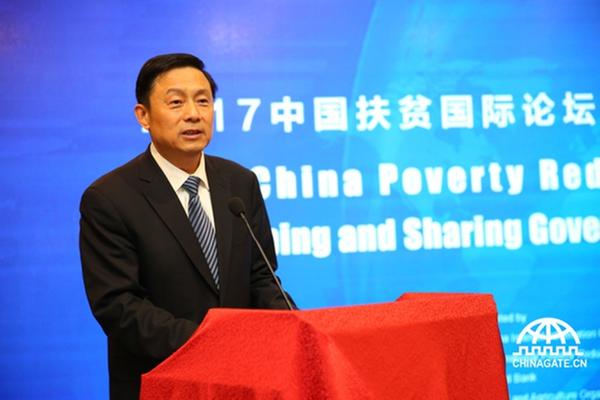 |
|
|
Guo Weimin, Vice-Minister of State Council Information Office, said that China's experiences in poverty alleviation are part of the spiritual heritage of humanity. With 700 million people living in poverty worldwide, China should take creative approaches to telling its stories, so as to establish a platform for knowledge-sharing between China and the international community. He also emphasized the role of ICTs in poverty alleviation, saying that the Global Poverty Reduction Online Knowledge Sharing Database is a typical example.
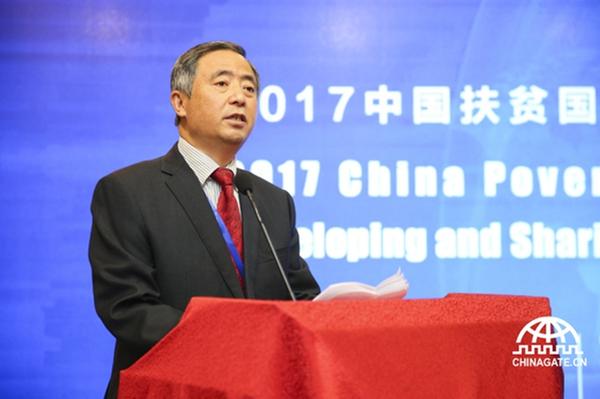 |
|
|
Chen Zhigang, Deputy Director of the State Council Leading Group Office of Poverty Alleviation and Development, spoke highly of China's efforts in lifting more than 700 million people out of poverty. He pointed out that it is a result of strong leadership, comprehensive policies, targeted measures, increased investment and an incentive mechanism, providing inspirations for global poverty alleviation governance.
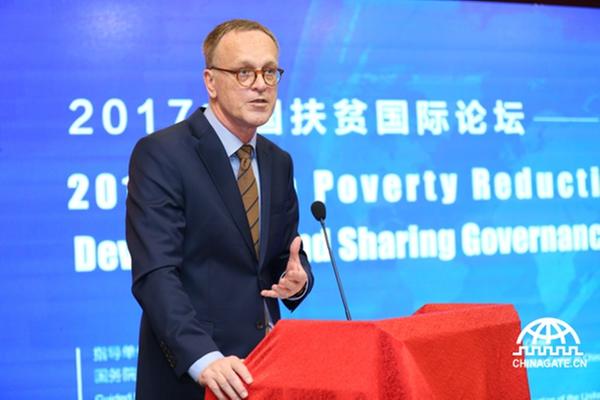 |
|
|
Bert Hofman, World Bank Country Director of China, Mongolia and Korea, supported Chen's point by analyzing the international application of China's poverty reduction experiences. He highlighted both enabling social economic environment for broad poverty reduction and specifically tailored anti-poverty approaches in the following five aspects. These include i) long-term overarching strategic planning and policy, ii) gradual economic reform, job growth and continual infrastructure improvement, iii) boosting agricultural productivity, iv) targeted and systemic poverty reduction. v) urbanization driven by industry-based development zones.
 |
|
|
Vincent Martin, FAO Representative in China and DPR Korea, called for greater south-south cooperation to accelerate the global eradication of extreme poverty. He said that to build a world where no one is left behind, and to help achieve SDG1 and SDG2, the invaluable poverty reduction policies and know-how generated in China and elsewhere should be made available to the international community.
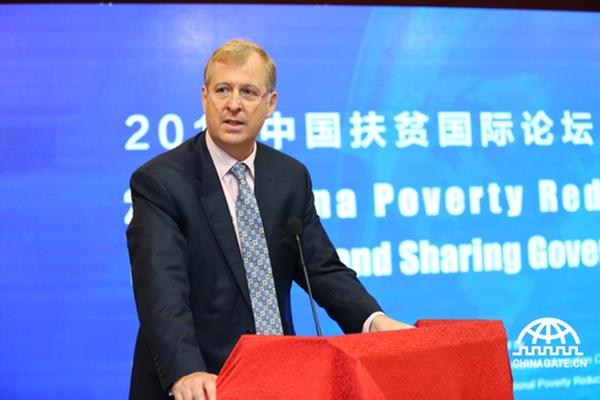 |
|
|
Benedict Bingham, Country Director, PRC Resident Mission, ADB, maintained: "policy making in China has always been conscious of the need to avoid leaving the vulnerable behind. So, there has been a conscious effort to push reforms to expand opportunities, while also calibrating the speed of those reforms to avoid creating win-lose imbalances and complementing those reforms with reforms that brought expanded access to social services and education."
 |
Hoonae Kim, Director, Asia and the Pacific Division, Program Management Department, International Fund for Agricultural Development (IFAD), proposed investing in rural people through inclusive rural finance. In this regard, IFAD has been strengthening productive capacities for rural poor, paying special attention to women, promoting market participation by smallholder farmers, and building resilience to climate variability and other vulnerabilities for the last 40 years.
In addition, researchers and representatives from the field of business shared ideas for best-practice in poverty reduction. For example, professor Pun Ngai and associate professor Julia Wang from Hong Kong University analyzed issues among the new generation of working poor and proposed intervention models. Zhang Jianping, General Manager of Jiujianpeng Group, illustrated how poverty could be reduced through the honeysuckle flower industry, while Chen Haida, Board Chairman of Ada Technology (Beijing) shared the application of logistics in poverty reduction.
Since the battle against poverty was launched in 2015, China has come up with many innovative and effective practices in targeted poverty alleviation. To eradicate poverty, China focuses on communication and cooperation with other developing countries and international organizations, while receiving from them the latest theories and best practices. By actively implementing the UN 2030 Agenda, China has made an enormous contribution to global poverty reduction.
- Experts: Lai not freedom fighter, but a pawn of the West
- China planning to raise age limit for blood donors, shorten the minimum interval
- Breakthrough in BMI tech aids patients
- Chinese technique for making ultrathin metal films named top 10 scientific breakthroughs
- Former senior political advisor of Sichuan sentenced to 14 years
- Beijing has undergone dramatic improvements since 2017's revamped development plans





































